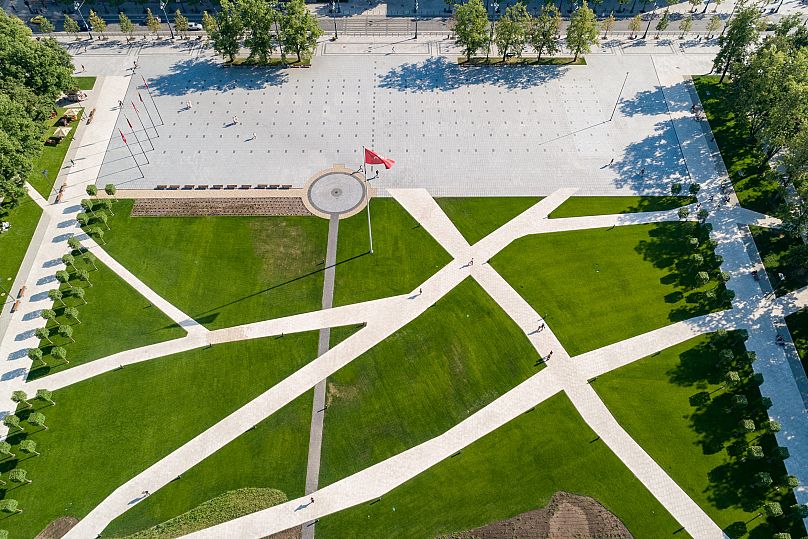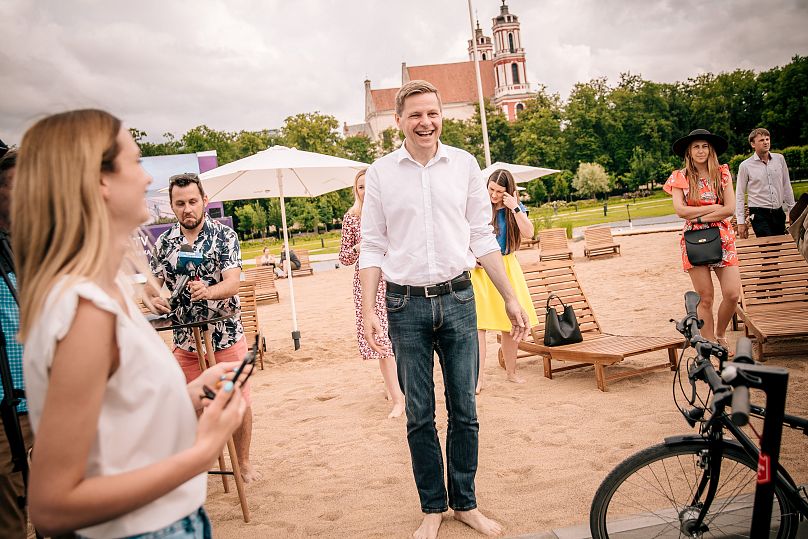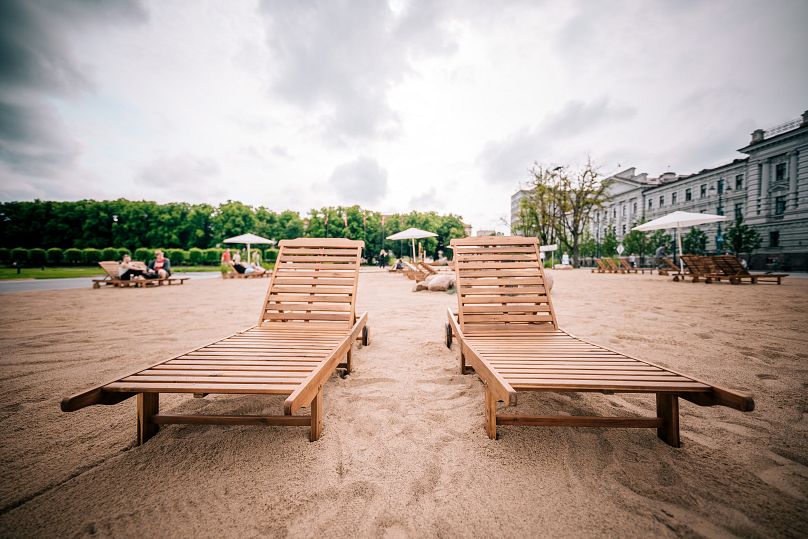Traditionalists say it disrespects Lithuanian insurgents executed on the same square as the beach in the 1860s. Liberals say the country should move on.
The opening of a city centre beach in a part of Vilnius famous for its bloody past has dug up divisions and sparked a firestorm.
 ADVERTISEMENT
ADVERTISEMENT
 ADVERTISEMENT
ADVERTISEMENT
Lukiskiu Square was where Lithuanian insurgents were executed in 1863-1864 during Tsarist Russia's occupation of the country.
Now city chiefs have turned the square into a summer holiday resort, complete with white sand, sun loungers and changing booths. It has large screens relaying the sounds of the Baltic Sea, 300km away.
But, for some, the mix of hedonism and history is too much.
Traditionalists claim that by opening the beach, Vilnius has spat in the face of the 19th century Lithuanian insurgents.
Laurynas Kasciunas, a hardliner from the centre-right Homeland Union – Lithuanian Christian Democrats (TS-LKD) party, condemned it as a sacrilegious act that smears the past.
'Suffocated by the shadows of the past'
Modernists, however, argue that Vilnius — and Lithuania — have to finally turn this bloody page of history and enjoy the sweet fruits of its hard-fought freedom.
“I am very excited about the Open Beach and I fully support the idea," Vilnius councillor Tomas Vytautas Raskevicius told Euronews.
"Freedom has to be celebrated through different manifestations, like this one, for example. Otherwise, it will get suffocated by the shadows of the past.“
This opinion is echoed by others who want to see Vilnius as being modern, fashionable and looking more to the future than the past.
Remigijus Simasius, the liberal mayor of the Lithuanian capital, undoubtedly leads the choir.
“The popular seaside resorts of southern Europe are not easily accessible at the moment and our Baltic Sea beaches will be packed this summer," he said.
"That's why we needed a solution to help people recoup some of that vacation vibe on Vilnius' very own beach."
Lukiskiu Square wasn't just where Tsarist Russia’s general and governor of Vilnius, Mikhail Muravyov, nicknamed “hangman” for his cruelty, hung Lithuanian insurgents in the 1860s. During the Soviet years, there stood a monument for Vladimir Lenin. Its dismantling in the early 1990s embodies for many a new Lithuania: a free and democratic one.
Cultural shift?
But are Lithuanians ready to shake off its historical suffering and embrace a more hedonistic approach to the capital's public spaces?
“In a sense, I believe we can speak of an ongoing cultural shift here," Arkadijus Vinokuras, a writer and political commentator told Euronews.
"The mayor (Simasius) is striving to consolidate the modern Vilniusans, ones who are well-travelled and who are open to different cultures. They are not dependent on the narrative of the nation’s sufferings and aches anymore,”
Approving of the beach does not mean that Vilniusans do not respect the past, he added.
“That means that they love life and want to live it to the fullest," he said. "People cannot be joyful if the tearful stories are retold over and over again. I am affirming this as a Lithuanian and a Jew.”
In terms of invasions, no other Lithuanian city has spilt more blood over the last two and a half centuries than Vilnius. But having been trampled on by Napoleon's army, the Russian and German empires, the Nazis, the Soviets and the Poles, Vilnius is now set to glance less over its shoulder and focus more on the future.
“It just feels wonderful to be here," Bronius, from Vilnius, said of the beach. "Truck-loads of sand poured in the square, the wooden pathways, the lifeguard towers, the changing booths and even the warning about sharks nearby gives a feeling of being in a far-flung holiday destination, certainly not in Vilnius. I personally do not think it smears the historic heritage of the square.”
How much is this about the forthcoming election?
Analysts say the beach is also a litmus test of the electoral mood — in Vilnius at least — ahead of parliamentary elections in October.
“Like any decision, this one, too, has cemented two bitterly opposite political camps in the country – the conservatives and the liberals. The former has been building their political capital on the narrative of a 'suffering Lithuania' for years, but now things might be just slowly changing for them.” Vinokuras said.
Unlike the older generation that traditionally votes right, Simasius and young voters do not feel nostalgia for the past, added Vinokuras
“Otherwise, we all would have to walk on tiptoes in Vilnius – its every slab has been soaked with blood over the centuries,” he said. “Cultural change is impossible without a change of generations, and it is ongoing."
But Alvydas Medalinskas, a political scientist and one of the spearheads of Sajudis, Lithuania‘s national movement in the 1990s, has a different view.
"Indeed, we can perhaps speak of the loss of memory about our historic past by part of our society and stronger hedonistic trends, but the Open Beach is a mere political gimmick, one aimed to rally supporters before the election," he said.
"I am convinced that as the mayor and a human being who is in charge of the city, he should have chosen another spot for it, definitely not the square that represents Vilnius and its history."
What do you think? Was it a good choice of location for a city beach? Does it disrespect the country's history? Let us know in the comments below.













